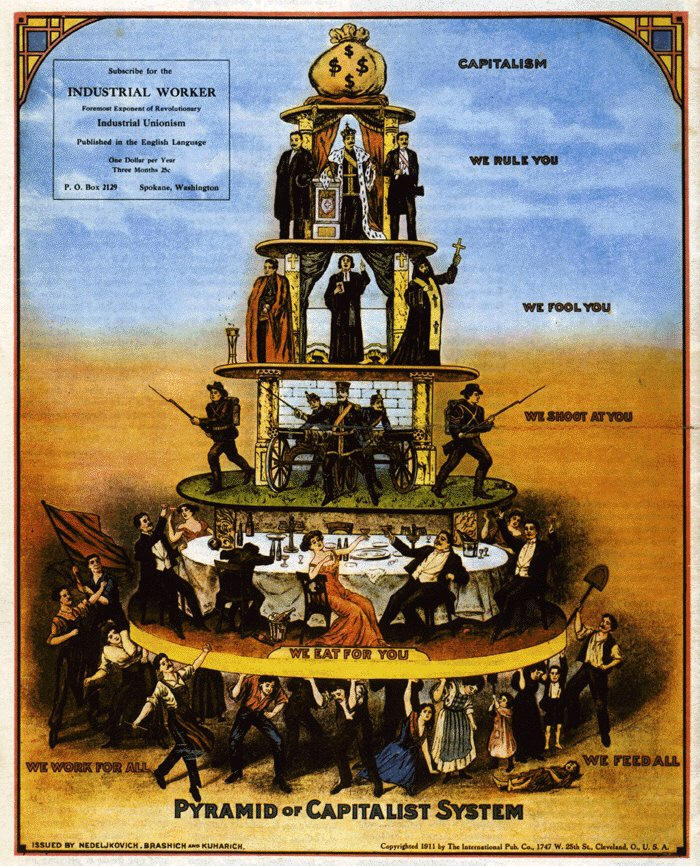Ekonomi-Politik:
Kapitalizm - Capitalism
Capitalism

Capitalism is an
economic system in which the means of production are privately owned and
operated for a private profit; decisions regarding supply, demand,
price, distribution, and investments are made by private actors in the
free market; profit is distributed to owners who invest in businesses,
and wages are paid to workers employed by businesses and companies.
There is no consensus on the precise definition of capitalism, nor how
the term should be used as an analytical category. There is, however,
little controversy that private ownership of the means of production,
creation of goods or services for profit in a market, and prices and
wages are elements of capitalism. There are a variety of historical
cases to which the designation is applied, varying in time, geography,
politics and culture. Some define capitalism as where all the means of
production are privately owned, and some define it more loosely where
merely "most" are in private hands while others refer to the latter as
a mixed economy biased toward capitalism. More fundamentally, others
define capitalism as a system where production is carried out to
generate profit, or exchange-value, regardless of legal ownership
titles. Private ownership in capitalism implies the right to control
property, including determining how it is used, who uses it, whether to
sell or rent it, and the right to the revenue generated by the property.
Economists, political economists and historians have taken different
perspectives on the analysis of capitalism. Economists usually emphasize
the degree that government does not have control over markets (laissez
faire), and on property rights. Most political economists emphasize
private property, power relations, wage labor and class. There is
general agreement that capitalism encourages economic growth. The extent
to which different markets are free, as well as the rules defining
private property, is a matter of politics and policy, and many states
have what are termed mixed economies.
Capitalism, as a deliberate economic system, developed incrementally
from the 16th century in Europe, although proto-capitalist organizations
existed in the ancient world, and early aspects of merchant capitalism
flourished during the Late Middle Ages. Capitalism became dominant in
the Western world following the demise of feudalism. Capitalism
gradually spread throughout Europe, and in the 19th and 20th centuries,
it provided the main means of industrialization throughout much of the
world. Today the capitalist system is the world's most dominant form of
economic model.
Criticism
Critics of capitalism
associate it with:
- unfair distribution of wealth and power;
- a tendency toward market monopoly or oligopoly (and government by
oligarchy);
- imperialism, counter-revolutionary wars and various forms of economic
and cultural exploitation;
- repression of workers and trade unionists;
- social alienation;
- economic inequality;
- unemployment; and
- economic instability.
Notable critics of capitalism have included:
- socialists,
- anarchists,
- communists,
- social democrats,
- technocrats,
- some types of conservatives,
- Luddites,
- Narodniks,
- Shakers and
- some types of nationalists.
Marxists have advocated a revolutionary overthrow of capitalism that
would lead to socialism, before eventually transforming into communism.
Many socialists consider capitalism to be irrational, in that production
and the direction of the economy are unplanned, creating many
inconsistencies and internal contradictions. Labor historians and
scholars such as Immanuel Wallerstein have argued that unfree labor by
slaves, indentured servants, prisoners, and other coerced persons is
compatible with capitalist relations.
Many aspects of capitalism have come under attack from the
anti-globalization movement, which is primarily opposed to corporate
capitalism. Environmentalists have argued that capitalism requires
continual economic growth, and that it will inevitably deplete the
finite natural resources of the Earth.
Many religions have criticized or opposed specific elements of
capitalism. Traditional Judaism, Christianity, and Islam forbid lending
money at interest, although alternative methods of banking have been
developed. Some Christians have criticized capitalism for its
materialist aspects. Indian philosopher P.R. Sarkar, founder of the
Ananda Marga movement, developed the Law of Social Cycle to identify the
problems of capitalism (wp).
|

